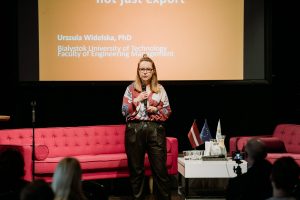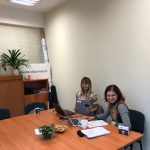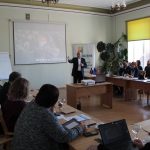The research carried out as a part of the ‘GoSmart BSR’ project in 7 countries of Baltic Sea Region during the last year show that internationalisation as a concept is too narrowly understood – entrepreneurs see it mainly as export and import, when in fact it is so much more. Internationalisation by its definition is
“the process through which companies increase their awareness of the impact of international operations on their future development as well as establish international relationships and enter into transactions with companies from other countries” (Beamish, 1990).
It means that knowledge of entrepreneurs on internationalisation models should be strengthened by explaining other potential ways of transnational cooperation.
At the end of February Vidzeme Planning Region organised Vidzeme Innovation Conference as part of Vidzeme Innovation Week, where representative of ‘GoSmart BSR’ project leading partner Wieslaw Urban, Professor of Bialystok University of Technology, and Urszula Widelska, PhD, lecturer and teacher at Bialystok University of Technology, introduced the project and its potential for strengthening internationalisation and innovation of SMEs.
The focus of Prof.W.Urban speech was on internationalisation aspect and how SMEs can benefit from it, “it is not merely export. SMEs have yet not taken the full advantage of internationalisation, because they do not know how to, what and with whom to internationalise.” He emphasised the potential of SMEs’ cooperation with research institutions, that could give SMEs the necessary impulse for growth. “While big companies optimise their activities among different locations internationally, SMEs cannot do it. The solution for SMEs is networking. This is the time of international value webs that go beyond the model of simple channels of suppliers, manufacturers, distributors and consumers”, summarised Prof.W.Urban.
In turn, Urszula Widelska, Ph.D., pointed out that for companies existing only on domestic markets it is nearly impossible to develop new ideas and sell their product. The era of globalisation demands to take an active role in participating in transnational entrepreneurial activities – being constantly aware of global market trends ensures the company can rapidly adapt and respond to new demands.
U.Widelska, Ph.D., highlighted yacht industry as an inspiring example how stereotypes of small companies are being destroyed by them operating on a transnational level. International experience has allowed them to:
- acquire new distinctive skills and knowledge; expanding the business into foreign markets require unique set of skills for selling in various countries with different ways of doing things and different cultures.
- set new trends; by combining the effort and expertise all partners in the network are better able to innovate and grow, and increase their competitiveness on many levels.
- building relationships; international business connections may provide companies with access to resources that would otherwise be beyond the scope of a single business. Individual businesses can face a number of limitations when trying to compete in global markets. This may include scale and expertise. Through collaboration, businesses can often complement each other and specialise in different areas to compete in markets usually beyond their individual reach.
“Internationalisation is multidimensional and relational process. There are not only typical relationships – like the ones with the customers, but those with universities, cooperation with other companies, and, of course, cooperation with competitors,”
U.Widelska, Ph.D., further listed the benefits of many forms that internationalisation can take.
One of the main ideas of ‘GoSmart BSR’ project is to develop a new transnational approach to smart specialisation strategies and introduce a system of fostering SMEs’ innovation-based internationalisation. A tool for implementation such smart specialisation strategy is Transnational Innovation Brokerage System (TIBS) that effectively supports internationalisation of innovation between SMEs of partnering regions. TIBS allows to access 7 brokers and the net of 7 other countries, matching businesses with researchers and public bodies, and such opportunities for cooperation with partners from different countries will give value for each side involved.
Right now, TIBS is at its first pilot cycle within ‘GoSmart BSR’ project, and Innovation brokers are working on consulting the companies and looking for new ways to bring their ideas to international level. Prof.W.Urban expressed confidence to make TIBS sustainable and to spread it on a broader scale.
Here are the full presentations of Prof.Wieslaw Urban and Urszula Widelska, Ph.D.:
#GoSmartBSR #InnovateAcrossBorders #BalticSeaRegion #Interreg #internationalisation #vidzemesinovacijunedela #smartspecialisationstrategy











